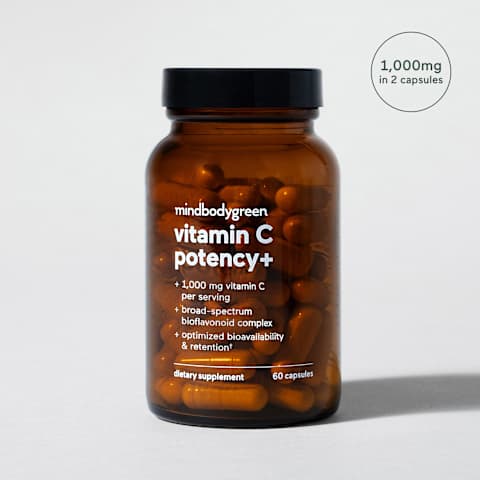Advertisement
There's A 50/50 Chance You're Not Getting Enough Of This Vitamin + What To Do About It



You enjoy the occasional orange and you're definitely not a 16th-century sailor lacking access to produce, so why should you be concerned about your vitamin C levels?
While your instinct to question the concern of true (as in, unmistakable) vitamin C deficiency (which affects only 6% of the American population1) is valid, far more adults are insufficient in vitamin C than you may realize. And insufficiency in this essential nutrient teeters right beside full-on deficiency. (Talk about too close for comfort.)
Vitamin C insufficiency in the U.S.
It turns out a whopping 42% of U.S. adults2 are insufficient in vitamin C (per blood test results), while 118 million American adults are failing to consume adequate amounts of vitamin C daily from their diet alone—that's nearly half of the population3! Even though long, treacherous trips across the sea devoid of citrus fruits are far behind us, it seems we're still not getting enough vitamin C in 2022.
In fact, even mindbodygreen's co-founder and co-CEO, Colleen Wachob, has struggled to reach sufficient vitamin C levels. "As a healthy eater, I was shocked last year to find out from my doctor that I had hypovitaminosis C, aka vitamin C deficiency. It's more common than you might think," she shares.
According to Alexander Michels, Ph.D., clinical research coordinator at the Linus Pauling Institute at Oregon State University, it can be difficult to recognize when your body isn't getting enough of this essential vitamin.
"Vitamin C insufficiency is mainly a silent issue. If you're not getting the recommended levels of vitamin C in your diet, it weakens your antioxidant defenses—a problem that presents with no obvious or immediate signs,"* he explains.
Why is vitamin C important?
Let's review vitamin C's purpose in the body so you can fully understand the shock value (and personal gravity) of these statistics.
Vitamin C is an essential nutrient that is extremely important in a number of physiological functions.
Most notably, perhaps, is its ability to scavenge free radicals and maintain oxidative stress balance (a vital process that protects your cells on a daily basis).*
In addition to its antioxidant activity, vitamin C aids in collagen production4 (which promotes both joint and skin health, to name a few, since collagen is ubiquitous in the human body), supports cognitive function5, helps protect eyes from UV-induced oxidative stress6, and more.*
Michels notes that low vitamin C intake can affect the proper function of the immune system7 and even have consequences for cardiovascular health8.*
Talk about whole-body nutrient implications.
How much vitamin C do we need daily?
When we say vitamin C is an "essential" vitamin, we're not just saying it's important. There's an actual definition: As mbg's VP of scientific affairs Ashley Jordan Ferira, Ph.D., RDN, explains, "The term 'essential' here means we must consume vitamin C exogenously (i.e., from diet and supplements) daily because we do not have the physiological ability to produce it endogenously."
She goes on to share, "While this sounds like a super basic fact—that you need vitamin C every day—in practice, many people treat daily nutrient intake and nutritional sufficiency like something that just magically happens. In reality, it takes thought and effort."
According to the National Academies9, the daily recommended dietary allowance (RDA) for vitamin C is 90 milligrams for men and 75 milligrams for women. Certain individuals—such as women who are pregnant (85 milligrams) and lactating (120 milligrams) women—require additional vitamin C each day. These are baseline daily minimums for vitamin C sufficiency.
To put these baseline quantities into perspective, according to the USDA's nutrient analyses, a whole orange contains 68 milligrams of vitamin C10, a whole kiwi contains 64 milligrams11, and a whole grapefruit contains 78.6 milligrams12.
As for higher vitamin C needs, smokers are estimated to require an additional 35 milligrams of vitamin C daily. Ferira explains, "That's because, unfortunately, smoking reduces vitamin C levels in your blood and white blood cells. Another reason to strongly consider smoking cessation."
Additionally, male gender, younger age, body composition (e.g., overweight and obesity), food insecurity, lower income, and even race (Black and Mexican American) have been tied to higher risk for vitamin C insufficiency2.
Is it possible to have too much vitamin C?
Vitamin C is a water-soluble vitamin, which means your kidneys regulate the amount of vitamin C in your blood through a process called renal absorption, and what isn't needed gets excreted through your urine.
As far as vitamin C toxicity goes, the concern here is extremely minor (and absurdly difficult to reach through diet alone). Technically speaking, the National Academies defines the tolerable upper intake level (aka UL) as 2,000 milligrams per day9. Casually speaking, that's a crazy amount of citrus fruit (we're talking more than 100 limes a day).
By definition, this UL is "the highest level of daily nutrient intake that is likely to pose no risk of adverse health effects to almost all individuals in the general population." As such, most people will not experience any negative side effects from typical dietary and supplemental intake levels, or high vitamin C intake (even at 2,000 milligrams a day). That said, there are a few specific health considerations that directly correlate with excess vitamin C consumption:
- Vitamin C aids in iron absorption, so anyone with iron-related health considerations (especially issues related to high iron levels) should speak to their health care provider before taking a vitamin C supplement.*
- Consuming too much vitamin C, particularly through supplement forms that are not gentle on the GI tract, may lead to digestive health complaints, especially in individuals prone to such considerations.
- High vitamin C intake may increase urinary oxalate and uric acid excretion in those with such a biological predisposition—which may contribute to kidney-related health issues. Individuals with preexisting renal concerns should discuss vitamin C supplementation with their health care provider.
Getting enough vitamin C.
With the right food choices (and some vitamin-C-savvy nutritional awareness), it is possible to meet the daily baseline needs for vitamin C from fruits and vegetables alone. That said, half of American adults are failing to do so each day.
Here are some vitamin-C-rich foods that can help you focus and increase your intake:
- Citrus fruits (e.g., lemons, limes, oranges, tangerines, grapefruit)
- Cruciferous veggies (e.g., broccoli, kale, cabbage, Brussels sprouts, cauliflower)
- Kiwi
- Acerola cherries
- Potatoes
- Peppers
- Strawberries
If you're looking for a guaranteed, more concentrated way to consume the vitamin C you need each day, consider a highly absorbable daily vitamin C supplement—such as mindbodygreen's vitamin C potency+.*
As Ferira points out, "The bulk of vitamin C research for targeted doses supporting immune response13 and other health functions is at 500 milligrams, 1,000 milligrams, and up. Indeed, 1 gram of vitamin C isn't just a round number. It has direct relevance for our daily health that's rooted in clinical research."*
In just two capsules, vitamin C potency+ provides that desirable potent dose (that's 1,000 milligrams—the vitamin C equivalent of 15 oranges) with optimized vitamin C bioavailability and retention. This optimization is thanks to an advanced (and vegan) trio of vitamin C, rice bran lipids, and a broad-spectrum lineup of citrus bioflavonoids (from 100% citrus fruits!) clinically shown to maximally promote healthy vitamin C levels in the blood, plus demonstrate superior absorption rate and free-radical-scavenging abilities14 when compared to other major forms of vitamin C.*†
The takeaway.
Even though we're well into the 21st century, vitamin C insufficiency and dietary deficits are affecting nearly half of the population and deserve our utmost attention.
If you struggle to eat enough vitamin-C-rich foods throughout the day, consider a premium, high-potency vitamin C supplement to not only bridge your nutrient gap but also reap the antioxidant, immune, and brain health benefits of this vital nutrient.*
If you are pregnant, breastfeeding, or taking medications, consult with your doctor before starting a supplement routine. It is always optimal to consult with a health care provider when considering what supplements are right for you.
14 Sources
- https://www.ncbi.nlm.nih.gov/labs/pmc/articles/PMC8180804/
- https://www.mdpi.com/2072-6643/13/11/3910/htm
- https://www.ncbi.nlm.nih.gov/labs/pmc/articles/PMC7352522/
- https://www.ncbi.nlm.nih.gov/labs/pmc/articles/PMC7827176/
- https://www.ncbi.nlm.nih.gov/labs/pmc/articles/PMC5622720/
- https://www.ncbi.nlm.nih.gov/labs/pmc/articles/PMC7602486/
- https://www.ncbi.nlm.nih.gov/labs/pmc/articles/PMC5707683/
- https://www.cambridge.org/core/journals/british-journal-of-nutrition/article/vitamins-and-cardiovascular-disease/038FBE6D62E38E69C428AAAA68B4A595
- https://www.ncbi.nlm.nih.gov/books/NBK225480/
- https://fdc.nal.usda.gov/fdc-app.html#/food-details/169918/nutrients
- https://fdc.nal.usda.gov/fdc-app.html#/food-details/168153/nutrients
- https://fdc.nal.usda.gov/fdc-app.html#/food-details/174676/nutrients
- https://www.ncbi.nlm.nih.gov/labs/pmc/articles/PMC7589163/
- https://pubmed.ncbi.nlm.nih.gov/17901843/
